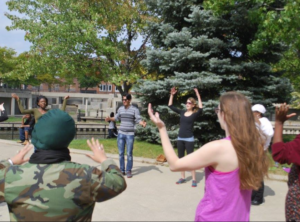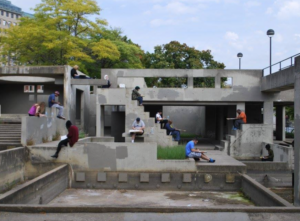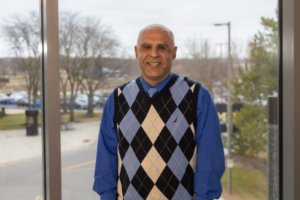Emma Davis, theatre and dance lecturer, and Jason Kosnoski, associate professor of political science, recently received a $25,000 U-M Arts Initiative award to engage with Flint-native musical artist Tunde Olaniran for the creation of a public performance festival in Flint this Summer. The collaborators will work to bring together a variety of performance artists from both the local and national level.
The theme of the grant was “Arts & Resistance,” and the project will pursue that theme by exploring how creativity and artmaking emerge from social and political unrest and help to resist oppression. The project asks the main question, “How can movement function as a political activity that can create new kinds of community, identity, and ways of looking at the world?” They will create a performance experience that will bring together students, faculty, artists, and Flint community to connect in new ways through movement, dance, music, and art.

Davis and Kosnoski will be integrating the performance and project with their First Year Experience class, Dancing in the Streets, a History of Collective Joy, which is centered around the Barbara Ehrenreich book of the same name. The class is a part of the Mellon-funded Borders & Crossings FYE classes that aim to help incoming UM-Flint students think about the ways they relate to their own identities, each other, the campus community, and outward in concentric circles to macro-issues like deindustrialization and globalization.
The theme of the grant was “Arts & Resistance,” and the project will pursue that theme by exploring how creativity and artmaking emerge from social and political unrest and help to resist oppression. The project asks the main question, “How can movement function as a political activity that can create new kinds of community, identity, and ways of looking at the world?”
The project is a continuation of previous but separate work by Davis and Kosnoski. They connected through mutual interest around the ways activists often create spaces in their efforts to change things. Davis did much of her Master’s thesis, the Riverbank Park Dance Project, on the 1970s Lawrence Halprin-designed park. Kosnoski’s recent book, The Political Theory of Salvage (SUNY 2022), centers on these topics as well and looks at the ways that resistance groups use found materials to create public space.

Davis has a long history of dance and movement in public spaces. She has developed and led several community dance projects with university students, adults with disabilities, senior citizens, public high school students, and incarcerated youth. She has also worked as a background dancer for Flint artist and project collaborator Olaniran for the past several years on a national and international scale.
“Tunde has a lot to offer outside of being a Flint artist,” says Davis, “they have a lot of connections and experience, worldwide. I really trust their insight and curation to bring a really great opportunity and experience for the people of Flint.” Olaniran is also an alumnus of UM-Flint and graduated with a Master’s in Public Health.
The project aims to lead the students and community to cross the border of themselves and others as they collaboratively explore spaces through dance and collectivity to construct the final festival performance. “I think Tunde,” says Davis, “is an excellent example of Borders & Crossings, that they are able to cross borders between Flint and other cities, and within the city of Flint as well. They’re just fluid in that sense.”
“The (Dancing in the Streets) book is based on the concept of collective joy, and I think that is the resistance. It’s interesting to think about joy being resistance, but in a world where polarization is happening; coming together is resisting.”
Emma Davis
Helping to address UM-Flint’s passion to integrate research with learning and community engagement, the project “will also encourage them to cross the many social and political borders that exist between the campus and community in Flint.” Kosnoski’s political science background will bring a depth to the many ways that students and, indeed we all, can navigate and influence global social and political issues. “We hope to motivate people to become more civically engaged by emphasizing how even the smallest actions can have political import.”





